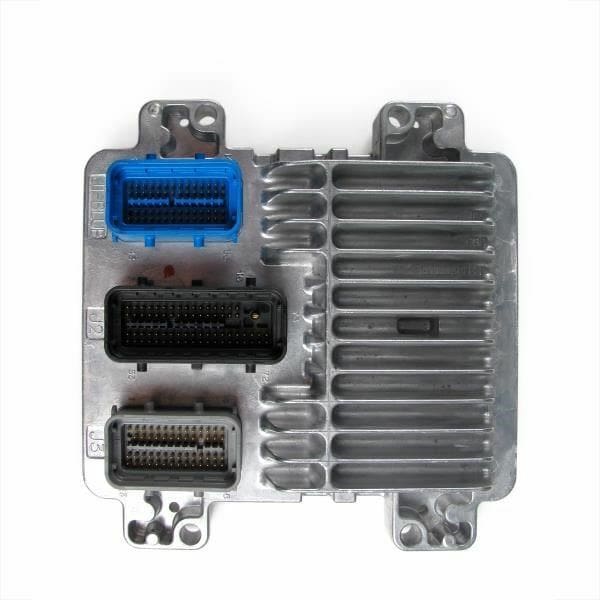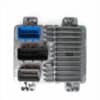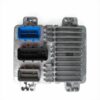Is Your 2006 Isuzu Ascender Running Rough? The PCM Might Be the Culprit.
The Powertrain Control Module, or PCM, is the central command center for your vehicle’s engine and transmission. It processes data from dozens of sensors to manage critical functions like fuel injection, ignition timing, and transmission shifting. When the PCM begins to fail in your 2006 Isuzu Ascender or other compatible GM vehicle, it can lead to a cascade of frustrating and potentially damaging issues. From a persistent check engine light to a vehicle that won’t start at all, a faulty PCM can bring your daily drive to a grinding halt. This replacement module, part number 19209821, is the definitive solution to restore your vehicle’s performance, reliability, and efficiency.
From the Diagnostic Bay
We once had a 2006 Chevy Trailblazer come in with classic signs of a bad PCM: erratic shifting, stalling at idle, and a check engine light that wouldn’t quit. The owner had already replaced the spark plugs, ignition coils, and even the throttle body with no success. Before condemning the expensive module, we did a full system check. We discovered a corroded ground wire near the engine block that was causing intermittent voltage drops to the computer. After cleaning and securing the ground connection, all the symptoms vanished. This is a crucial reminder: always verify power and ground connections to the PCM before replacing it. A simple wiring issue can perfectly mimic a complete module failure, saving you hundreds of dollars.
Common Symptoms of a Failing PCM
If you’re experiencing any of the following issues, a failing powertrain control module could be the root cause. Confirming these symptoms can help you make an accurate diagnosis and get the right part the first time.
- ✔ Check Engine Light: The most common indicator. The light may be on constantly or flash intermittently, often with codes related to module communication or sensor circuits (e.g., P0600-P0606).
- ✔ Engine Stalling or Misfiring: The engine may stall unexpectedly while driving or at a stop. You might also notice rough idling, hesitation during acceleration, or random engine misfires.
- ✔ Poor Fuel Economy: A failing PCM can’t properly regulate the air-fuel mixture, leading to a noticeable and sudden drop in your vehicle’s gas mileage.
- ✔ No-Start Condition: In severe cases, the PCM can fail completely, preventing the engine from starting at all. You may have power to the accessories, but the engine won’t crank or fire up.
- ✔ Harsh or Erratic Shifting: The PCM also controls the transmission. You might experience delayed shifting, gears slipping, or the vehicle getting stuck in one gear (limp mode).
- ✔ Communication Errors: Your mechanic’s diagnostic scan tool may be unable to communicate with the PCM, which is a strong sign of internal failure.
The Plug-and-Play Solution: Our Pre-Programmed 2006 Isuzu Ascender PCM
Don’t settle for a generic, unprogrammed module that will require an expensive trip to the dealership. We take the guesswork and extra cost out of the equation. When you order this 2006 Isuzu Ascender PCM, we flash it with the latest, most stable software updates directly from GM. By providing your vehicle’s Vehicle Identification Number (VIN) during checkout, you ensure that the module arrives programmed specifically for your truck’s configuration. This process accounts for your engine type, transmission, and any factory options, making installation as simple as possible.
This module is a direct replacement for a wide range of original equipment part numbers, including 12569773, 12589311, 12597521, and 19209821. It is engineered to meet or exceed OEM specifications for performance and durability. Once installed, it will seamlessly integrate with your vehicle’s existing systems, restoring the precise control and communication necessary for optimal operation.
Installation and Security Relearn
Physical installation is straightforward. The PCM is typically located in the engine bay (on the LH side for the Ascender/Trailblazer platform or RH firewall for the Colorado/Canyon). Simply disconnect the negative battery terminal, unplug the wiring harnesses from the old module, unbolt it, and install the new one in its place. After reconnecting the harnesses and battery, you may need to perform a simple security relearn procedure, often called the “Passlock” or “Anti-Theft” relearn. This can usually be done without special tools and involves a sequence of turning the key in the ignition. Instructions for this procedure are widely available and ensure the new PCM communicates correctly with your vehicle’s anti-theft system.
Frequently Asked Questions
Why do you need my VIN?
Your VIN (Vehicle Identification Number) is essential for us to program the PCM with the exact software and calibrations for your specific vehicle. This includes engine size, transmission type, and other factory options, ensuring a perfect match and plug-and-play installation.
Is this a simple DIY installation?
For someone with basic mechanical skills, yes. The physical swap involves disconnecting the battery, unplugging a few connectors, and removing a few bolts. The most critical step after installation is the security relearn procedure, which can typically be done at home by following simple key-cycling instructions.
Will this fix my check engine light?
If the check engine light is caused by a faulty PCM, then yes, this replacement will resolve the issue. However, it’s crucial to ensure the problem isn’t with a sensor or wiring. We recommend having the codes professionally diagnosed before ordering to confirm the PCM is the root cause.
What happens if I install it without programming?
An unprogrammed PCM will not work in your vehicle. It will not have the correct software to manage the engine or transmission, and the anti-theft system will prevent the vehicle from starting. Our pre-programming service saves you this step and the added expense of dealership programming.
Is this compatible with other vehicles besides the Isuzu Ascender?
Yes, this PCM is compatible with a wide range of 2004-2006 GM vehicles, including the Chevy Colorado, GMC Canyon, Hummer H3, Buick Rainier, and Saab 9-7X. Please check the detailed fitment list on this page to confirm compatibility with your specific model and engine.


